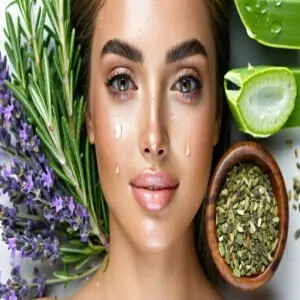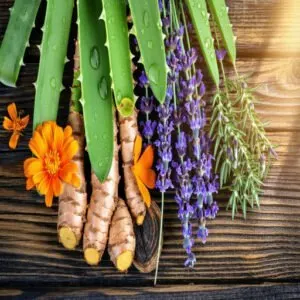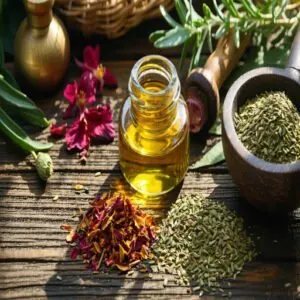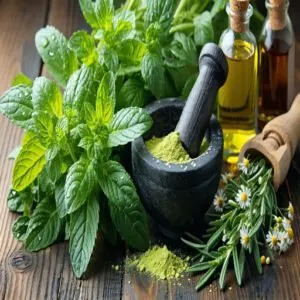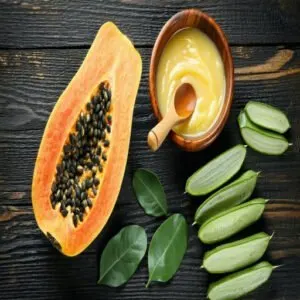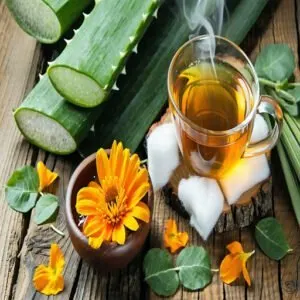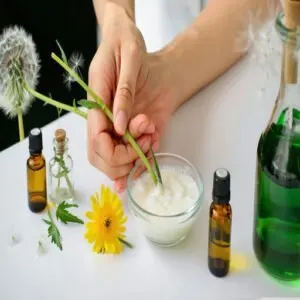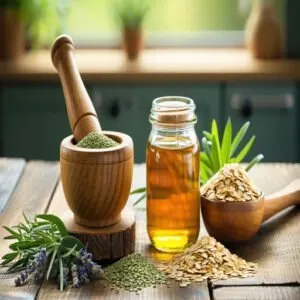This site is supported by our readers. We may earn a commission, at no cost to you, if you purchase through links.
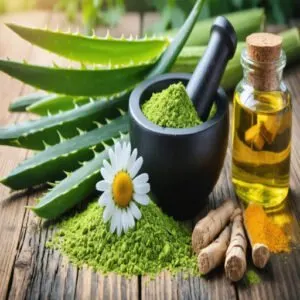
Herbal skin remedies like aloe vera deliver deep hydration while strengthening your skin’s protective barrier.
Turmeric works wonders on acne and dark spots, while chamomile’s calming properties tackle redness and irritation.
Green tea’s antioxidants shield your skin from environmental damage, helping unclog pores for a clearer complexion.
These gentle, plant-based solutions offer powerful results without harsh chemicals or expensive treatments.
From healing wounds to fighting signs of aging, herbs pack quite a punch – and we’re just scratching the surface of what these natural powerhouses can do.
Table Of Contents
- Key Takeaways
- Herbal Skin Remedies Benefits
- Choosing Quality Herbs
- Using Herbal Skin Remedies
- Herbal Remedies for Skin Issues
- Natural Ingredients for Skin Health
- Frequently Asked Questions (FAQs)
- What is the best herb for skin?
- What is the miracle herb for skin?
- What is the best natural treatment for skin?
- What plant heals skin?
- How long do homemade herbal skin remedies last?
- Which herbs should not be mixed together?
- When is the best time to apply herbs?
- Do herbal remedies work differently on aging skin?
- Conclusion
Key Takeaways
- You’ll love how aloe vera deeply hydrates, strengthens your skin’s barrier, and promotes healing with anti-aging benefits.
- Turmeric fights inflammation, brightens dark spots, and protects against UV damage with powerful antioxidants.
- Chamomile calms redness, soothes irritation, and supports your skin’s protective barrier with its natural healing properties.
- Green tea’s antioxidants shield your skin from environmental stress, unclog pores, and reduce inflammation for a clearer complexion.
Herbal Skin Remedies Benefits
You’ll discover how nature’s most powerful herbs can transform your skin with essential nutrients and healing compounds that work in harmony with your body.
These time-tested remedies offer gentle yet effective solutions for common skin concerns like dryness, inflammation, and acne, while supporting your skin’s natural protective barrier.
Aloe Vera Skin Benefits
Recent clinical studies confirm aloe vera’s remarkable skin benefits.
This natural powerhouse delivers deep hydration while strengthening your skin’s moisture barrier.
You’ll find its gel particularly effective for wound healing and burn treatment, while its anti-inflammatory compounds calm irritated skin.
For best results, look for pure aloe vera gel in your herbal skincare routine – it excels at skin regeneration and delivers potent anti-aging properties.
Turmeric Skin Benefits
Golden-hued turmeric, a powerful herbal skincare ingredient, fights free radicals while promoting wound healing.
You’ll find this natural skin remedy’s antioxidant effects particularly effective for managing skin inflammation.
Emerging research suggests turmeric offers potential health benefits due to its anti-inflammatory and antioxidant properties, as detailed on this turmeric research overview.
Clinical studies show turmeric’s impressive absorption rate makes it a standout among herbal remedies for skin.
- Combats inflammation and redness in acne-prone skin
- Accelerates natural healing of scars and blemishes
- Brightens dark spots and evens skin tone
- Provides potent antioxidant protection
- Reduces visible signs of UV damage
Chamomile Skin Benefits
Nature’s gentle healer, chamomile oil works wonders as one of the most effective herbal skin remedies.
You’ll find this natural remedy packed with chamazulene, a powerful antioxidant that calms irritated skin.
Research suggests chamomile may improve wound healing, according to this article on chamomile benefits.
Here’s what chamomile can do for your complexion:
| Benefit | Application |
|---|---|
| Skin Soothing | Apply herbal calming oil to reduce redness |
| Acne Control | Use gentle products with chamomile extract |
| Barrier Support | Layer skincare herbs in daily routine |
Green Tea Skin Benefits
While chamomile calms your skin, green tea takes protection to the next level.
This powerhouse herb’s polyphenols shield your skin from UV damage and environmental stress like a natural bodyguard.
Green tea antioxidants fight free radicals that speed up aging, while helping unclog pores and reduce inflammation.
You’ll notice less redness and a clearer complexion when you add this natural skin remedy to your routine.
Choosing Quality Herbs
You’ll want to start with fresh, high-quality herbs that show vibrant colors and strong natural scents to get the best results for your skin remedies.
When you’re picking out herbs, look for organic options without any signs of damage or discoloration, since these will give you the most potent healing benefits.
Best Herbs for Skin Care
Through centuries of traditional use and modern research, five herbal skin remedies stand out for their proven benefits.
Aloe vera delivers powerful hydration and wound healing support, while turmeric’s antioxidants brighten your complexion.
Your skin’s best friends include calendula and lavender for inflammation, plus witch hazel’s natural astringent properties.
These plant extracts work together to create a natural skincare powerhouse.
How to Select Herbs
Your herbs’ quality makes or breaks your herbal skin remedies.
When selecting dried herbs for natural skin remedies, trust your senses, look for vibrant colors and strong fragrances that match fresh plants.
For herbal blending and plant extraction, always choose dried over fresh herbs—moisture in fresh herbs can lead to mold in oil-based preparations.
Prioritize organic sourcing to guarantee your herbal skincare recipes remain pure and potent, and opt for high-quality organic dried herbs which are readily available online, ensuring you have the best ingredients for your natural skin remedies.
Quality Control Measures
While selecting quality herbs demands attention to detail, understanding regulatory compliance and product testing confirms you’re getting safe, effective ingredients.
For a closer examination into herbal skincare, explore this guide on herbal skin care products.
Look for suppliers who follow WHO manufacturing standards and conduct regular quality checks, and choose herbs with proper certification processes, focusing on organic and nonGMO options.
Check if suppliers maintain strict supply chain controls and document their testing procedures for heavy metals and contaminants.
Using Herbal Skin Remedies
You’ll find that using herbal skin remedies isn’t just about applying random plants to your face – it’s about choosing the right herbs and using them correctly for your specific skin concerns.
Whether you’re dealing with acne, dry patches, or inflammation, these time-tested natural solutions can transform your skincare routine when you follow proper application methods and safety guidelines.
Application Methods
Now that you’ve got your herbs ready, let’s explore the best ways to use them.
Your herbal skin remedies work differently based on how you apply them.
From topical treatments to homemade serums, each method serves a unique purpose.
You can find a variety of herbal face mask products online.
Create herbal infusions by steeping herbs in hot water for 15-20 minutes.
Apply herbal face masks using clean fingers or a brush, avoiding the eye area.
Mix natural exfoliants with honey or yogurt for gentle scrubbing.
Layer your DIY herbal skin care treatments from lightest to heaviest.
Combine herbal skin toner with aloe vera for extra hydration benefits.
Safety Precautions
While applying herbal remedies feels exciting, let’s talk safety first.
You’ll want to perform patch testing before trying any new remedy – it’s your skin’s best defense against unexpected reactions.
| Safety Step | What to Check | Protection Level |
|---|---|---|
| Patch Test | Redness & Itching | Primary Defense |
| Wait 24 Hours | Skin Sensitivity | Maximum Safety |
| Gentle Application | Irritation Signs | Ongoing Care |
Always start with small amounts on your inner arm for irritation prevention.
Potential Side Effects
The soothing promise of herbal remedies can sometimes mask hidden risks.
You’ll want to watch for allergic reactions like contact dermatitis, blisters, or skin irritation.
Some herbs, especially St. John’s Wort and tea tree oil, may cause sensitivity or adverse effects.
Before applying any new remedy, do a patch test – it’s your best defense against unexpected skin reactions or herbal interactions that could disrupt your skincare routine.
Herbal Remedies for Skin Issues
You’ll find relief from common skin problems like acne, dryness, and inflammation with nature’s healing herbs that have been trusted for centuries.
These gentle yet powerful plant-based solutions can transform your troubled skin into a clearer, calmer complexion without harsh chemicals or expensive treatments, utilizing nature’s healing herbs.
Acne and Hyperpigmentation
Those dark spots giving you trouble?
Research shows vitamin C is your secret weapon for hyperpigmentation treatment.
Combine citrus-rich remedies with aloe vera for a powerful acne treatment duo – aloe’s natural aloin tackles blemish control while citrus prevents melanin production.
For acne-prone skin, exploring organic skin remedies for acne can offer holistic and natural solutions.
Try a DIY papaya face mask packed with vitamin C.
Your skin tone will thank you.
Dryness and Inflammation
Combat dry, inflamed skin with powerful herbal remedies that restore your skin’s natural balance.
A variety of dry skin herbal products are available to address specific needs.
These botanicals deliver deep hydration and calming relief:
- Aloe vera gel penetrates deeply to lock in moisture while reducing redness
- Calendula-infused oil soothes irritated patches and strengthens your skin barrier
- Chamomile tea compresses provide immediate comfort for sensitive areas
- Green tea’s antioxidants fight inflammation and protect delicate skin
- Coconut oil seals in hydration for lasting relief from dryness
This approach allows for a more centered treatment plan tailored to individual skin concerns, ensuring effective management of dry skin through the use of herbal remedies.
Skin Tags and Irritations
Those pesky skin tags won’t stand a chance against proven herbal remedies for skin.
Tea tree oil leads the pack for tag removal, while a mix of castor oil and baking soda offers powerful irritation relief.
Here’s your guide to natural soothers:
| Treatment | Application | Results Time |
|---|---|---|
| Tea Tree Oil | Cotton ball 3x daily | 10-12 days |
| Castor Oil + Baking Soda | Thick paste overnight | 7-14 days |
| Dandelion Stem | Direct juice application | 14-21 days |
For lasting skin care results, consistency is key.
Natural Ingredients for Skin Health
You’ll find your kitchen’s natural treasures can work wonders for your skin, with ingredients like honey, oats, and Epsom salt offering powerful benefits backed by science.
These simple ingredients work together with your skin’s natural processes to reduce inflammation, fight acne, and give you that healthy glow you’re looking for.
Epsom Salt Benefits
While research shows mixed results for magnesium absorption, you’ll find Epsom salt offers multiple skin benefits through salt therapy.
Here’s what current studies reveal about Epsom salt’s effects:
- Provides gentle skin exfoliation and inflammation relief
- Works best when applied directly to skin for mineral absorption
- Supports detox methods through mineral compounds
- Aids skin hydration during therapeutic baths
- Enhances other herbal skin care tips through complementary effects
Remember to test a small area first.
Honey Skin Benefits
While Epsom salt soaks away skin troubles, honey works as your skin’s sweet protector.
Medical-grade honey‘s powerful antimicrobial properties fight common skin infections, including resistant bacteria.
You’ll love how this natural moisturizer creates a noticeable glow while strengthening your skin’s barrier. For best results, apply raw organic honey as a mask—its antioxidants and enzymes provide deep skin healing benefits.
Oats for Skin Care
Like honey’s healing touch, oats offer remarkable skin-soothing properties that go beyond your breakfast bowl.
When you’re dealing with irritated or dry skin, colloidal oats become your skin’s best friend.
Colloidal oatmeal effectively soothes irritated skin, according to this natural facial skin care guide.
Here’s why oatmeal masks work wonders:
- Creates a protective barrier that locks in moisture
- Contains natural compounds that calm inflammation and redness
- Gently exfoliates while balancing your skin’s pH levels
Mix oats with warm water for instant skin relief.
Soy for Skin Health
While oats offer skin-soothing comfort, soy’s got serious game too.
These omega-rich beans pack isoflavones that boost collagen and tighten skin naturally, whether you’re slathering on soy-based creams or sipping soy milk.
You’ll tap into proven anti-aging benefits. Clinical studies show it tackles hyperpigmentation and wrinkles like a pro, while keeping your skin hydrated and bouncy.
It’s a natural skincare powerhouse that delivers real results.
Frequently Asked Questions (FAQs)
What is the best herb for skin?
Cool as a cucumber, aloe vera‘s your skin’s best friend.
You’ll love how it hydrates deeply, heals wounds, fights aging, and calms inflammation – all while staying non-greasy and naturally soothing.
What is the miracle herb for skin?
Turmeric emerges as your skin’s ultimate powerhouse.
It’s packed with curcumin, a natural compound that fights inflammation, bacteria, and aging.
You’ll love how it heals wounds and brightens your complexion naturally.
What is the best natural treatment for skin?
Aloe vera stands out as your best option for skin health.
It deeply hydrates, heals wounds, fights inflammation, and battles aging.
You’ll love how it soothes and repairs without feeling greasy.
What plant heals skin?
Imagine your skin’s a battlefield.
Tea tree oil’s your mighty warrior.
It’ll fight mild acne, athlete’s foot, and tackle those pesky wounds,
while evening primrose steps in as your skin’s natural shield.
How long do homemade herbal skin remedies last?
Without preservatives, most homemade skin remedies last 1-2 weeks in the fridge.
You’ll want to make small batches and watch for changes in color, smell, or texture.
Always label with the creation date.
Which herbs should not be mixed together?
Dancing through your skincare routine requires caution.
You’ll want to keep vitamin C away from retinol products, never mix strong exfoliants together.
Avoid combining lavender with tea tree oil for best results.
When is the best time to apply herbs?
The morning offers perfect timing to apply nourishing herbs right after cleansing, while evening applications work best for healing and repair.
You’ll want to match specific herbs to your skin’s daily rhythm.
Do herbal remedies work differently on aging skin?
By 50, skin loses about 20% of collagen, making it thinner and slower to heal.
Herbal remedies like ginseng and turmeric work differently by boosting collagen, reducing inflammation, and targeting wrinkles, giving aging skin extra support.
Conclusion
Transform your skincare routine with these herbal skin remedies that are simple, soothing, and sustainable.
From aloe vera’s hydration boost to turmeric’s brightening touch, these plant-based solutions tackle common concerns like acne, dryness, and irritation.
Choosing quality herbs and applying them correctly guarantees you’ll see real results without breaking the bank.
Nature’s medicine cabinet offers powerful, gentle alternatives to harsh chemicals, giving you a radiant, healthy glow with herbal skin remedies that are simple to use.
Give these remedies a try, and your skin will thank you.
- https://dosedaily.co/blogs/skincare/herbs-for-skin-care
- https://www.stylecraze.com/articles/best-herbs-and-spices-for-skin/
- https://spavelous.com/herbal-remedies-in-beauty-goodbye-to-skin-problems/
- https://sacredplantco.com/blogs/natures-pharmacy-exploring-the-historical-uses-and-health-benefits-of-medicinal-herbs/herbal-skin-remedies-natural-solutions-for-a-healthier-complexion
- https://www.ancientherbswisdom.com/medicinal-herbs-for-skin-health/

